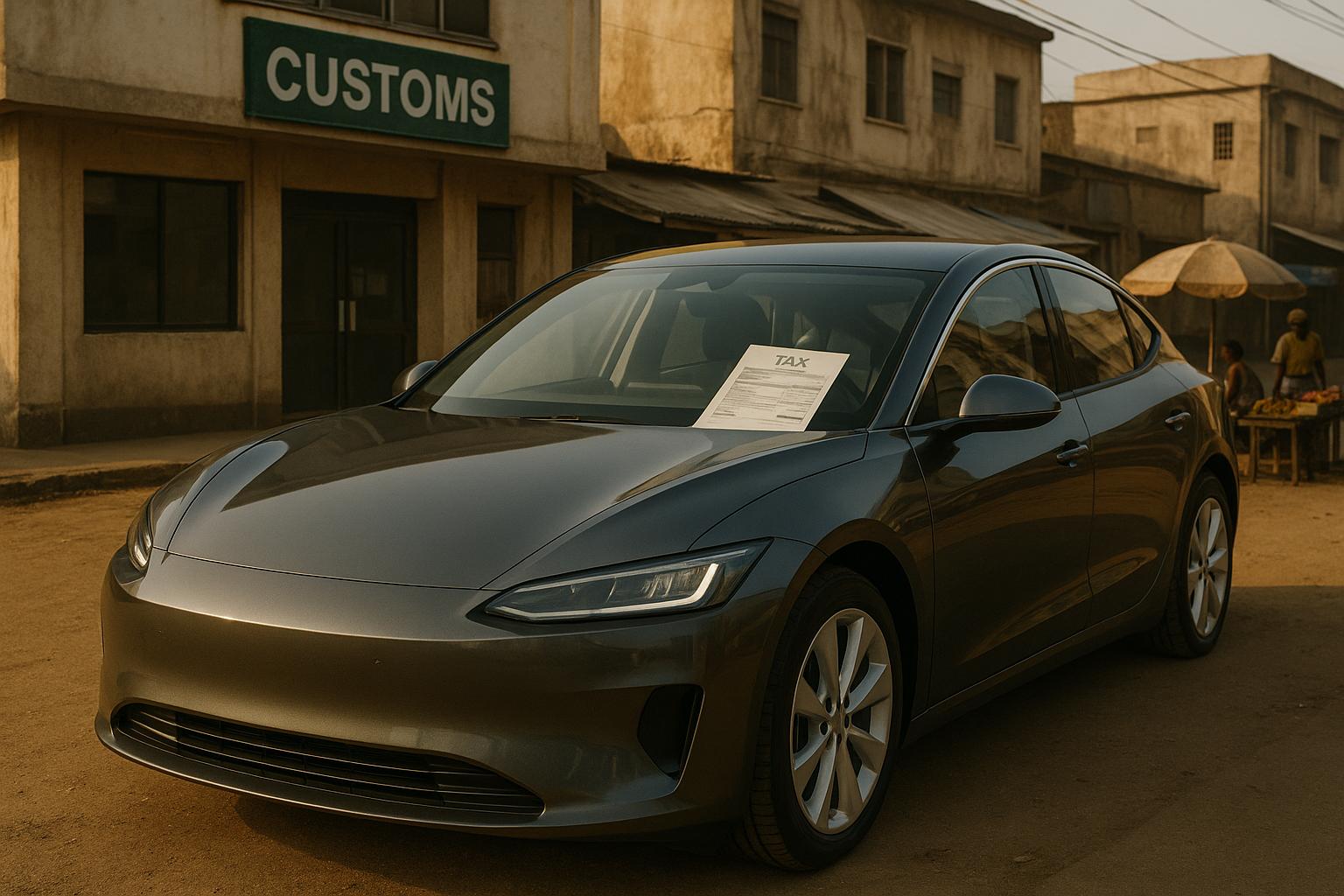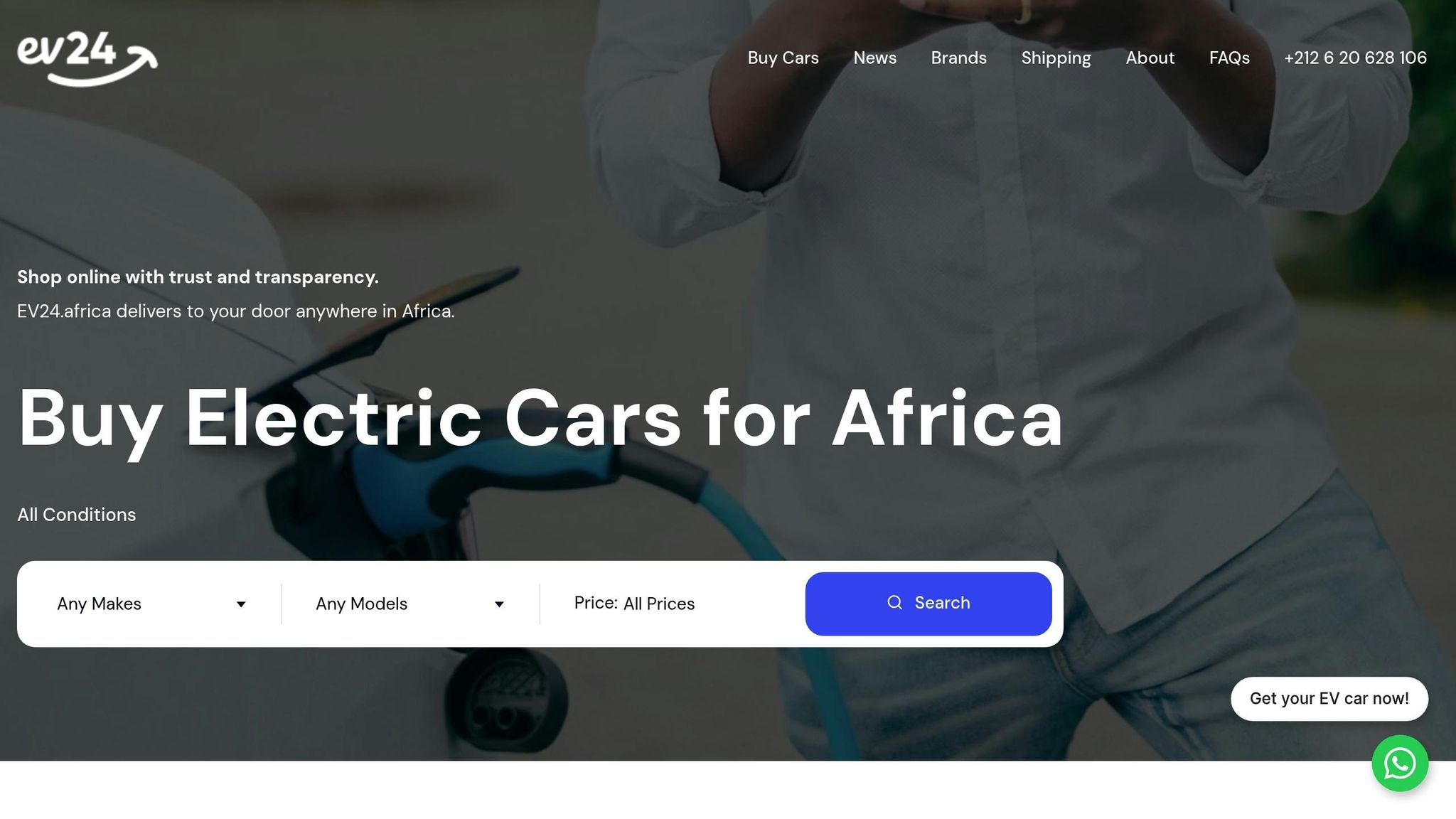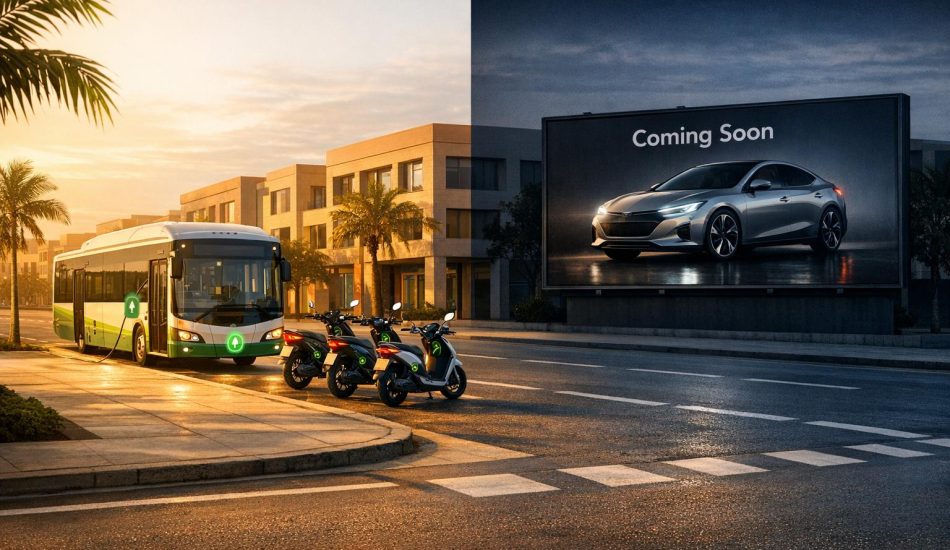
Electric vehicles (EVs) are taxed as luxury items in many African countries due to outdated tax policies, high import duties, and a lack of local manufacturing. These taxes significantly increase EV prices, making them less accessible to the average consumer. Here’s a quick breakdown of the issue:
- High Import Duties: EVs face duties up to 25%, compared to 18% for traditional vehicles in some regions like South Africa.
- VAT and Luxury Surcharges: Additional taxes, such as 15% VAT and ad valorem charges of up to 30% for vehicles over $50,000, further inflate prices.
- Policy Gaps: EVs are classified as luxury goods rather than practical transportation, ignoring their potential to address transportation and environmental challenges.
- Lack of Local Manufacturing: Heavy reliance on imports adds shipping costs, tariffs, and currency exchange burdens, further driving up prices.
These factors hinder EV adoption, limit affordability, and slow market growth. Addressing these challenges requires policy reforms, reduced taxes, and investments in local production and infrastructure.
Taxes Threaten Chinese EVs Adoption in Kenya
Tax Structures for EVs in Africa
In many African countries, electric vehicles (EVs) are subject to a mix of taxes that significantly increase their cost, often placing them in the luxury category. These tax systems are largely modeled after those applied to traditional vehicles, rather than being adjusted to reflect the specific nature of EVs.
Let’s break down the main taxes that contribute to this classification.
Main Taxes Applied to EVs
Three primary taxes – import duties, VAT, and ad valorem charges – heavily impact the final price of EVs in Africa.
Import duties are the biggest contributor to the high cost of EVs. For instance, in South Africa, the standard import duty for passenger vehicles is 25%. However, under the Free Trade Agreement with the European Union, vehicles imported from Europe receive a 7% reduction, lowering the effective rate to 18% for eligible EVs.
Value-added tax (VAT) is another significant cost factor. South Africa applies a 15% VAT on imported goods, including EVs. This tax is calculated after import duties are added, compounding the overall cost.
Ad valorem taxes are levied on luxury items, and EVs often fall into this category due to their advanced features and higher production costs. In South Africa, vehicles priced above $50,000 face ad valorem taxes of up to 30%. Given that many EVs exceed this price threshold, they are disproportionately affected by these charges.
EV vs. ICE Vehicle Tax Comparison
The disparity in tax treatment between EVs and internal combustion engine (ICE) vehicles underscores the pricing challenges for EVs in African markets. In South Africa, the current tax structure clearly favors traditional vehicles over electric ones.
| Tax Type | Electric Vehicles | Internal Combustion Engine (ICE) Vehicles | Difference |
|---|---|---|---|
| Import Duty | 25% (18% with EU agreement) | 18% standard | +7% higher for EVs |
| VAT | 15% | 15% | Equal |
| Ad Valorem (vehicles >$50,000) | Up to 30% | Up to 30% | EVs more likely to qualify |
The most striking difference lies in import duties, where EVs are taxed at 25%, compared to 18% for ICE vehicles. This 7% gap can translate to thousands of dollars in additional costs for EV buyers.
Tesla CEO Elon Musk has openly criticized these high import duties, calling them "super high" and identifying them as a major barrier to EV adoption in Africa. However, industry experts point out that this issue is tied to broader trade policies. Dr. Norman Lamprecht from the Automotive Industry Export Council and Automotive Business Council explains:
"It’s not about any differentiation between internal combustion vehicles and electric vehicles, but about our free trade agreements."
This complex tax system, which combines higher import duties with luxury surcharges, creates a double financial burden for EVs. As a result, they are often classified as luxury items, making them less accessible to the average consumer.
These tax policies illustrate why EVs struggle to gain traction in African markets. The following section will delve deeper into the factors driving these challenges.
Why EVs Are Luxury Items in Africa
Several factors contribute to the perception of electric vehicles (EVs) as luxury items in Africa. While EVs offer clear advantages, challenges related to cost, policy, and production keep them out of reach for most consumers.
High Base Prices and Import Costs
EVs come with hefty price tags, largely due to the advanced batteries and electronics they require. In Africa, where imports dominate the market, these costs skyrocket. Shipping fees, specialized handling, and fluctuating local currencies add even more financial strain. The result? EVs become a high-cost option, accessible to only a small segment of the population.
On top of these inherent costs, outdated regulations make the situation worse.
Policy Gaps and Outdated Regulations
In many African countries, tax and import policies haven’t caught up with the rise of EVs. Instead of being treated as vehicles with environmental benefits, EVs are often categorized alongside luxury goods, leading to higher import duties and taxes. This outdated approach stems from a lack of clear regulatory definitions and incentives tailored to EVs.
By contrast, regions with well-defined policies and incentives – like tax breaks or subsidies – create a more welcoming environment for EV adoption. Without similar measures, African markets continue to see EVs as products for the wealthy, especially given the lack of widespread charging infrastructure and targeted support.
Adding to these challenges is the absence of local manufacturing.
No Local Manufacturing Options
The reliance on imported EVs further solidifies their luxury status. Importing vehicles means dealing with international shipping costs, high tariffs, and unfavorable exchange rates. Starting local production could help reduce these costs, but significant barriers exist. High startup expenses, limited technical expertise, and insufficient processing capabilities make domestic EV manufacturing a daunting challenge.
Some platforms, like EV24.africa, are working to address these issues by offering transparent pricing and financing across the continent. However, long-term solutions require structural changes. Investments in local production, clearer regulations, and policies that support EV adoption are necessary steps to make these vehicles more affordable and accessible to everyday consumers.
sbb-itb-99e19e3
How Luxury Tax Affects EV Adoption
Luxury taxes drive up the cost of electric vehicles (EVs), making it harder for consumers in Africa to embrace clean transportation.
Consumer Affordability Problems
Luxury taxes significantly increase EV prices, putting them out of reach for many potential buyers. Take Kenya, for example – taxes can raise EV prices by over 50%. A vehicle priced at $25,000 can end up costing more than $37,500 after these levies.
This price hike hits middle-income buyers the hardest. These consumers, who are often financially stable and environmentally aware, find themselves priced out of the EV market. As a result, they often revert to purchasing traditional internal combustion engine vehicles.
Across many African markets, EVs can cost over 70% more than their gas-powered counterparts. For the average buyer, the short-term affordability challenge outweighs the long-term savings and environmental benefits of switching to electric. This affordability gap not only limits individual purchases but also slows the overall market’s growth.
Slower Market Growth Rates
High luxury taxes don’t just affect individual buyers – they slow the entire market’s progress. By keeping prices high, these taxes prevent the transition from early adopters to mainstream consumers. This stunted growth creates a ripple effect: low demand discourages investments in charging infrastructure and related services. Without these investments, EV adoption across Africa lags far behind global averages, delaying access to the economic and environmental advantages of electric mobility.
Even platforms like EV24.africa, which aim to promote EV adoption, face uphill battles in expanding the market under such taxing policies. To unlock the potential of EVs in Africa, policy changes are essential.
Lower Tax Impact Scenarios
Eliminating luxury taxes could make EVs more affordable, increase sales, and encourage infrastructure development. Without these taxes, EVs could better compete with premium internal combustion vehicles, opening the market to a larger group of buyers.
Lower prices would make clean transportation a realistic option for more consumers, aligning with efforts to grow the EV market. Higher sales volumes would encourage investments in charging networks and support services, creating a positive cycle that strengthens the EV ecosystem.
Policy reforms should go beyond just removing taxes. Governments need to treat EVs as essential transportation options and implement strategies that support long-term market growth and sustainability.
Policy Reform and Future Changes
Governments across Africa are rethinking how they classify luxury goods, particularly in ways that impact electric vehicle (EV) adoption. As mentioned earlier, the current system of labeling EVs as luxury items has significantly driven up their costs. This reassessment has led to discussions around tax and regulatory reforms aimed at making EVs more accessible.
Proposed Policy Changes and Incentives
Many African nations are now exploring adjustments to their tax policies to encourage EV adoption. Key proposals include reducing import duties and revisiting the criteria used to classify EVs as luxury items. By aligning tax policies with the lower operating costs and reduced emissions of EVs, governments could help close the price gap between EVs and traditional vehicles. A full reclassification of EVs could be a game-changing step toward long-term affordability.
Local Manufacturing and Infrastructure Development
Tax reforms alone won’t solve the issue – investments in local manufacturing and infrastructure are equally important. Producing EVs domestically can lower import-related expenses, while expanding charging networks makes EV ownership more practical. When governments prioritize both production capabilities and charging infrastructure, they create an environment that supports widespread EV adoption. Policies that encourage local production could shift EVs from being seen as luxury imports to everyday essentials.
EV24.africa‘s Market Insights

Platforms like EV24.africa highlight the growing demand for EVs by offering transparent pricing and detailed cost breakdowns for all 54 African countries. With its extensive delivery network, EV24.africa provides policymakers with valuable data on consumer preferences and behaviors. These insights strengthen the case for tax reforms that focus on making EVs more affordable and sustainable. By complementing earlier efforts to improve market transparency, such reforms could significantly reshape the transportation landscape across the continent.
Conclusion: Solving the Luxury Tax Problem
The challenge of high luxury taxes continues to stand in the way of widespread adoption of electric vehicles (EVs) across Africa. Tackling this problem requires a mix of smart policy changes, market growth, and user-friendly platforms that make EVs more affordable and accessible.
Addressing the tax issue starts with immediate policy reforms. Governments have a unique opportunity to make EVs more attainable by reducing or eliminating import duties on these vehicles. Reclassifying EVs from luxury items to essential transportation could significantly lower costs. As highlighted earlier, such changes can make a noticeable difference in affordability. Pairing these reforms with investments in local manufacturing and charging infrastructure would amplify their impact, creating a more sustainable ecosystem for EV adoption.
Beyond policy, transparent and reliable marketplaces are essential. Platforms like EV24.africa bridge the gap between policy reforms and consumer access, offering detailed pricing, financing options, and delivery services across all 54 African countries. These tools not only empower consumers with clear information but also provide the data needed to support informed policymaking.
For real progress, action is needed on multiple fronts. Policymakers require solid market data to push for tax reforms, consumers need clear and fair pricing along with financing options, and scalable marketplaces must support the entire EV ecosystem. By combining forward-thinking tax policies with accessible market solutions, EVs can shift from being seen as luxury imports to practical, everyday transportation. With the right approach, EVs can become an affordable and sustainable choice for African consumers, paving the way for a greener future.
FAQs
Why are electric vehicles taxed as luxury items in Africa, and how does this affect their adoption?
In many African nations, electric vehicles (EVs) are seen as luxury items, which means they are subject to higher import duties and taxes. This perception stems from the belief that EVs are pricey and cater only to a niche audience. Compounding the issue is the lack of local manufacturing and limited infrastructure, such as charging stations, to support these vehicles.
This classification significantly drives up the cost of EVs, putting them out of reach for the average buyer and slowing widespread adoption. It also creates a ripple effect, discouraging investments in the infrastructure needed to support EVs, like charging networks, which further stunts the market’s growth across the continent.
Amid these hurdles, platforms like EV24.africa are stepping up to bridge the gap. They aim to make EVs more accessible by offering a broad range of vehicles, clear and upfront pricing, and flexible financing options for buyers throughout Africa.
What policy changes could make electric vehicles more affordable in Africa?
Making electric vehicles (EVs) more affordable in Africa hinges on smart policy decisions. One approach could be slashing import duties on EVs and their components to as low as 2.5%. This would make EVs more accessible to buyers by directly lowering their upfront costs.
Another key step is providing tax breaks for charging infrastructure and EV-related equipment. This would help reduce operational expenses, making EV ownership less burdensome.
Governments could also offer substantial tax incentives for investments in local EV manufacturing. Encouraging production within the continent not only cuts costs but also supports job creation and economic growth. Together, these measures could pave the way for more widespread EV adoption and bring sustainable transportation closer to reality for many across Africa.
Why are electric vehicles so expensive in Africa, and how can this issue be resolved?
Electric vehicles (EVs) tend to be expensive in Africa, and a big reason for this is the lack of local manufacturing. With no significant production on the continent, countries have to rely on imports. These imports come with hefty tariffs, shipping fees, and import taxes, all of which drive up the final cost. On top of that, without domestic production, economies of scale – where mass production helps lower costs – are nearly impossible to achieve.
One way to tackle this challenge is by investing in local EV manufacturing. Africa is rich in raw materials essential for battery production, which gives the continent a unique advantage. By setting up manufacturing facilities and offering incentives like tax breaks or subsidies to local producers, costs could decrease significantly. This approach wouldn’t just make EVs more affordable – it could also create jobs and lay the groundwork for a thriving, sustainable EV industry in Africa.




